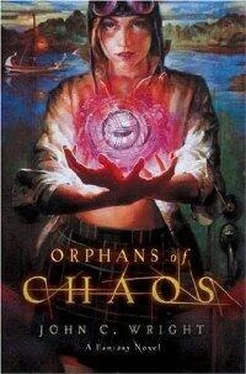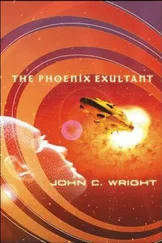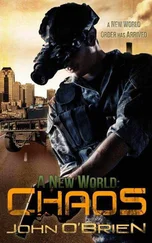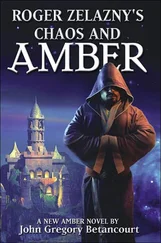But I didn’t laugh. “Someone would tell. They can’t just go on keeping us here forever.”
“Who is to tell?” he said. “Who will question their statements? Suppose they say I am fifteen. Don’t I look it? Who questions them? Who doubts them? Who is skeptical enough to go to the trouble to check?”
At that moment, a timer on the instrument bleeped.
Victor leaned in and looked at the eyepiece. He clicked the red button with his thumb. A moment later the LED readout lit up. 3.3214…
He said grimly, “The difference between the reading now and the reading at dusk is merely the angular momentum of the turning of the Earth. Light shot forward, tangentially to the turn, has the velocity of the Earth added, and travels faster. Light shot at a right angle, away from the axis, has no velocity added, and is slower. If we wait till dawn, the component of Earth’s rotation will be subtracted, and the velocity will be slower yet.”
“There must be a mistake,” I said slowly. “The instrument must be off.”
“Is that the most reasonable explanation?”
He turned and squinted. The light in the boys’ bathroom off the dormitory was flickering off and on, off and on. That was the signal that Mr. Glum had been seen leaving his little house on the back grounds, no doubt to pull a surprise inspection of the boys’ dorm.
There was no light in the girls’ bathroom. Either Mrs. Wren had not stirred and the girls’ dorm was safe, or else Vanity had fallen asleep at her post.
Victor stood. “I must run. Don’t let the equipment get damaged when you carry it back down the rocks.”
“Yes, master,” I said sarcastically. But he did not hear me, because he was already jogging down-slope.
Now I was alone, in the cold, with no one but the moon to look after me.
Well, there was no need to delay. I started doing, in my mind, that trick I had learned that made all burdens seem lighter than they were when I hoisted them, and I put my hands out toward the instrument.
I was thinking: it was impossible.
The angular momentum of the Earth’s rotation was so small a fraction of the speed of light, I know, that no possible instrument could detect a difference; and surely not a difference of nearly half a second over the (relatively) short distance between Earth and Moon. To be a valid experiment, the second reading would have to be taken half a month later, not half a day later, so that the velocity component added would have been that of the Earth’s motion around the sun.
So, instead of lifting the instrument just yet, I put my eye to the eyepiece, made sure the instrument was still centered on the same crater of the moon as it had been at dusk, reached, and hit the red switch.
The dish hummed as a radar beam was sent out, bounced off the moon, came back.
The LED readout lit up. 2.8955.
I had little trouble getting the tripod folded and the instrument case packed up, and getting the whole thing hidden under the bushes, where Victor would sneak them back into the lab in the morning, while he had cleanup duty.
But I had a great deal of trouble falling asleep that night. Surely it was just a quirky reading from a misaligned instrument, right?
Either that, or the speed of light acted differently when I was watching it than it did when Victor was watching it. Which is impossible, isn’t it? That is not what the Theory of Relativity means. Our notions of reality can change as we learn more; but reality itself, the great unknown, cannot change.
But if reality was unknown, how did I know it could not change?
I had a dream about the ship again that night. The man holding me overboard, holding a sword to my throat, was Dr. Fell.
3
The First of the Secrets
How did we all start debating about boundaries? When did we become convinced we were all something other than human? Every starting point has an earlier starting point before it. Some of the roots of how it came about, I remember. Others have become misty and autumn-colored with time.
If I had to choose a starting point, there were three I would select, not one. I remember when Victor made us all put our hands together and promise. I remember when Vanity found the notes, which had our lost tales in them. And then, many years later, Quentin discovered the secret.
I don’t know how old I was. Vanity (or Tertia, as she was called then) only came to my shoulder, and Quentin was small enough that Victor (Primus) could carry him in his arms. When he stood up, Quentin’s head only came to the level of Victor’s elbow. Quentin was too young for lessons; I remember being jealous when he was allowed to sit on the floor and play with a wooden horse on wheels while I had to practice penmanship, making rows and endless rows of slightly lopsided O’s and Q’s.
As for me, the doorknob to the coal cellar was right below the level of my eye, because when Mr. Glum slapped me roughly on the back of my head (I was afraid to open the door to the cellar) the doorknob struck me on the cheek, and I had a bruise there for a week.
I don’t remember why they were locking us in the coal cellar, but I do remember wishing and hoping that the Headmaster would come back from wherever he was, and set things to rights. He and Dr. Fell had dressed up in dark clothing, with black scarves fluttering from their top hats, looking grim and terrible. A funeral, I suppose. I remember the two stalking silently off into the freezing rain, wide black umbrellas overhead. The rest of the staff was particularly cruel to us that evening, or so it seemed to me. Mrs. Wren was raging up and down the corridors, howling like a banshee, toppling suits of armor on racks and pushing over floral vases that stood on the pillars next to the main doors. I think this was before she took up strong drink.
They locked us in the dark and cold. Whatever our crime had been, I did not know. It was dark and starless that night, the drafts smelled of snow, and the dirt floor was colder than ice.
I was shivering and my teeth were chattering. I remember Vanity saying, “Quentin’s all cold. He stopped moving. Is he going to die?” her voice was as thin and high as a flute.
Victor told us all to gather up in a huddle for warmth. His voice was high-pitched then, but it was very earnest, and just hearing it made me feel better. I could hear him rummaging around in the dark.
“This is a coal cellar,” young Victor said. “There is wood and kindling in the wood box.” There was a tremble in his voice, too, but I could hear how he forced himself to speak calmly.
Colin, or as he was called back then, Quartinus, said, “Boogers! There’s nothing to start a fire with! Mrs. Wren’s had a nightmare, and we’re all going to die for it.”
In the pitch blackness, Quentin’s voice came up from the pile where we all lay together, “A ghost. She saw her husband’s ghost.” I was relieved to hear him, because I was so very afraid he had passed away. Certainly his skin felt like ice up against mine.
Victor laid his coat over the pile of us. I wondered how he could stand the cold in his thin shirt, but he did not complain. Victor never complained. “I’ll start a fire. I’ll make something. Lend me your tie. I found a bent stick in the woodpile, and I can make a drill.”
Minutes passed, and it grew colder. I could hear Victor sawing away at something, the hissing noise of wood on wood, but no fire came.
“Boogers!” shouted Colin, who did not know any of the many foul words he was to learn later in life. “Do you think you are a Red Indian? Rubbing two bloody sticks together? We’re all going to die, and it will be your fault!”
Victor said to me, “Secunda. Get them talking. Keep their mind off it, you know? We’ve all got to hang together.”
Читать дальше











